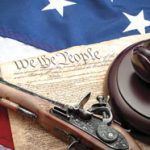The Ghosts Among Us
By Fred Mittag
“Remembering Sandy Hook”

The debate in colonial America was over maintaining state militias vs. a standing army. King George had a standing army that could oppress people. Colonists saw state militias as protection against the abuse of centralized authority.
But the Articles of Confederation had been a disaster. The need for strong central authority is what the Constitutional Convention was all about. Should that authority include a standing army?
There were no city police in early America. Every man between the ages of 16 and 60 was required to own a gun at home. The gunpowder, however, was kept in common storage in the town. The militias did police work and most importantly, were ready to keep potential slave rebellions under control. The final version of the Second Amendment passed by Congress and kept in the National Archives reads: “A well regulated Militia, being necessary to the security of a free State, the right of the people to keep and bear Arms, shall not be infringed.”
The Supreme Court ruled on several related cases over the next 200 years, and every time found that the Amendment applied only to the right of states to maintain a militia and not to any individual right to bear arms.
A grammatical point noted by scholars is that the first clause is an ablative absolute. In grammar, that means that the first clause sets the conditions for which the rest of the sentence is valid. What this means is that the part that says, “the right of the people to keep and bear arms” can only be in the context of the descriptive “A well regulated militia.”
In 1977, the NRA supported a ban on “Saturday Night Special” handguns. That same year, they had a convention in Cincinnati, Ohio. Angry conservatives who opposed the ban on “Saturday Night Specials” voted out the leadership of the NRA. Gun manufacturers began to give them money to lobby against gun laws. The NRA’s lurch to the far right was part of the abrupt shift across the Republican base. Racism played a major role, as millions of white Southern Democrats fled to the Republicans. They saw guns as important to their defense against racial dangers. In 2008, the election of a black president spurred a big spike in gun sales. Republicans own twice as many guns as Democrats.
Conservative Republican presidents appointed Republican judges. The stage was set. Congressmen were frightened of the NRA’s political power. The Supreme Court became a right-wing ideological majority of five.
A security guard named Dick Heller wanted to bring his gun home. But it was illegal in Washington, D.C. to have a handgun in one’s home. Heller challenged this and it came to the U.S. Supreme Court. Vice President Dick Cheney filed a brief with the Court, backing Heller.
Five Republican justices struck down the D.C. law banning guns in the home. In this one landmark case, 200 years of American jurisprudence was turned upside down. Now, for the first time, the Second Amendment protected an individual right to keep arms. This interference with the D.C. legislative process made this an “activist” Court.
As late as 1990, Republican Chief Justice Warren Burger wrote that the idea that the Second Amendment protected an individual right to keep arms was “. . . one of the greatest pieces of fraud, I repeat the word ‘fraud,’ on the American public by special interest groups that I have ever seen in my lifetime.”
Cities instituted police departments and America acquired a standing army. Militias vanished completely in 1903 and are now called the National Guard. They are trained at federal expense and are at the president’s disposal. The whole rationale for the Second Amendment evaporated. It would be extinct were it not for the case of Heller in 2008 that converted it to mean an individual right to keep arms.
However ideological, the Supreme Court is the final word on constitutional questions. The Heller decision means a lot of new questions will have to be decided. How far does this individual right extend? May a convicted criminal still buy firearms, as he has the right of continued free speech? Sorry, Noah.
- April 2024 – Issue - March 31, 2024
- April 2024 – Articles - March 31, 2024
- April 2024 - March 31, 2024









